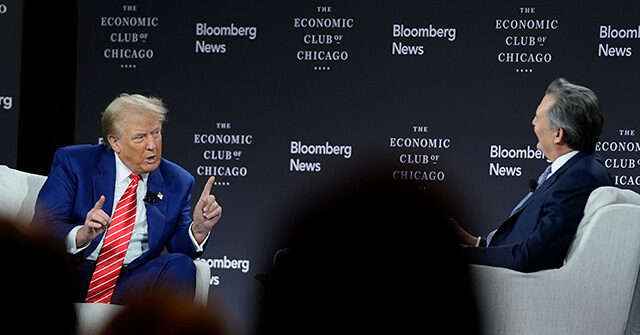In a recent onstage interview with Bloomberg News Editor-in-Chief John Micklethwait, former President Donald Trump discussed his economic policies, particularly focusing on trade tariffs and their implications for the U.S. economy. The event, held at the Economic Club of Chicago, served as a platform for Trump to champion his America First agenda. During the dialogue, Trump passionately defended his approach to tariffs, claiming it was instrumental in promoting American manufacturing and asserting that he had maintained low inflation during his presidency. His comments drew a critical response from Micklethwait, who challenged Trump on whether such a tariff-driven strategy would ultimately lead to increased prices for consumers.
Trump, dismissing concerns about inflation related to tariffs, confidently stated, “I had four years, no inflation.” This statement was part of his broader contention that his economic policies had effectively shielded the American economy from inflationary pressures. His responses were met with a mix of skepticism and laughter from the audience, especially when he directly addressed Micklethwait’s questioning, asserting that the journalist had been “wrong all your life” on these matters. Trump’s stance echoes a broader populist critique against traditional economic policies that lean towards globalization, positioning himself as a defender of American workers against foreign competition.
The interview illuminated a larger divide between Trump and established media outlets, particularly when Micklethwait referenced criticism from sources such as the Wall Street Journal. Trump retorted, stating, “They’ve been wrong about everything,” reinforcing his claim that mainstream economic narratives have failed to address the realities faced by American workers. The exchange highlighted the tension between Trump’s America First philosophy and conventional economic wisdom, raising questions about the role of tariffs in shaping both domestic industry and consumer prices.
Micklethwait’s performance during the interview was characterized by an adversarial stance, attempting to hold Trump accountable for his policies while navigating the complexities of audience sentiment. This dynamic was particularly evident as he navigated Trump’s defensive posture regarding economic criticism, illustrating how traditional media interactions with Trump often turn combative. Trump’s quick wit and ability to deflect criticism were on full display as he pushed back against perceived antagonism, employing humor to defuse tension while reinforcing his points.
The interview also reflected on Micklethwait’s background as a journalist, previously serving as the editor-in-chief of the Economist before his tenure at Bloomberg. His past controversies, particularly those surrounding the outlet’s policy of not investigating billionaire Michael Bloomberg during the 2020 Democratic primaries, cast a shadow over his credibility as a neutral journalist. This context added depth to the dialogue, as Trump and Micklethwait navigated the intersection of politics, media, and economic policy amid accusations of bias and selective reporting.
In conclusion, the onstage interview at the Economic Club represents a microcosm of the broader national debate surrounding economic policy, trade, and media integrity. Trump’s combative defense of tariffs and economic nationalism poses significant challenges for critics who question the efficacy of such policies. The enduring popularity of his America First agenda suggests that many American voters remain receptive to his critiques of globalization and the perceived failures of the establishment. As the political landscape continues to evolve, these discussions around tariffs and inflation will play a crucial role in shaping the discourse leading up to the next election.

